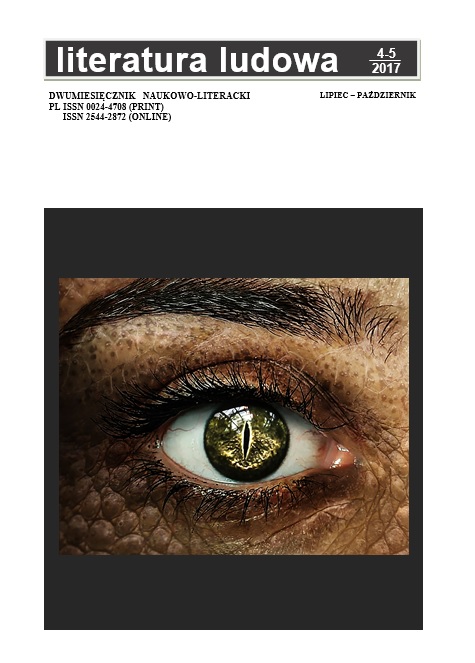The Demon byAnton Rubinstein: Between the Western and Russian Traditions (An Analysis of Selected Issues)
DOI:
https://doi.org/10.12775/LL.4-5.2017.007Keywords
demon, Anton Rubinstein, Russian music, Russian national school, operaAbstract
The article proposes an analysis of The Demon (1875), the only preserved opera by Anton Rubinstein, in two contexts. Firstly, it is a universal story based on fairy tales and related to the Byronic hero and the Western Romantic tradition. Secondly, it is a manifestation of the influence of the Russian national school (Moguczaja Kuczka). Therefore, the article elaborates in detail on the sacred opera (the influence of the French tradition), the function and structure of selected leitmotifs in the construction of the characters (the influence of the German tradition), and the later impact of the opera on Eugene Onegin (1879) by Pyotr Tchaikovsky.
References
ABRAHAM G. (1945). Anton Rubinstein: Russian Composer. „The Musical Times”, vol. 86, no 1234.
ALEXANDER, T. (2012). An ‘Extraordinary Engagement‘: A Russian Opera Company in Victorian Britain. W: A. Cross (ed.), A People Passing Rude: British Responses to Russian Culture. Cambridge: Open Book Publishers.
BAGNOLI, G. (1993). Demon (The Demon). Hasło w: The La Scala Encyclopedia of the Opera: A Complete Reference Guide, (transl. G. Fawcett). NY: Simon & Schuster.
BALLARD, L., BENGSTON, M., YOUNG, J. B. (2017). Scriabin Russian Roots and the Symbolic Aesthetic. In: L. Ballard, M. Bengston, J. B. Young, The Alexander Scriabin Companion: History, Performance, and Lore. London: Rowman & Littlefield Publishers.
CHUILON, J. (2009). Mattia Battistini: King of Baritones and Baritone of Kings, (transl. E. T. Glasgow). Lanham: Scarecrow Press.
CROSS, A. (2012). By Way of Introduction: British Reception, Perception, and Recognition of Russian Culture. In: A. Cross (ed.), A People Passing Rude: British Responses to Russian Culture. Cambridge: Open Book Publishers.
EMERSON, C., OLDANI, R. W. (2006). History of the Composition, Rejection, Revision, and Acceptance of ‘Boris Godunov‘. In: C. Emerson, R. W. Oldani, Modest Musorgsky and Boris Godunov: Myths, Realities, Reconsideration. Cambridge: Cambridge University Press.
FROLOVA-WALKER, M. (2011). A Ukrainian Tune in Medieval France: Perceptions of Nationalism and Local Color in Russian Opera. „19th-Century Music”, vol. 35, no 2.
GROBERG, K. A. (1997). The Shade of Lucifer's Dark Wing: Satanism in Silver Age Russia. In: B. G. Rosenthal (ed.), The Occult in Russian and Soviet Culture. NY: Cornell University Press.
JAFFÉ, D. (2012). Lermontov; Tamara. Hasła w: Historical Dictionary of Russian Music. Lanham: Scarecrow Press.
LUTZ D. (2006). The Dangerous Lover: Gothic Villains, Byronism, and the Nineteenth-Century Seduction Narrative. Columbus: Ohio State University Press.
MORRISON, S. (2002). Prokofiev and Mimesis. In: S. Morrison, Russian Opera and the Symbolist Movement. LA: University of California Press.
RICHARDSON, A. (2004). Byron and the Theatre. In: D. Bone (ed.), The Cambridge Companion to Byron. Cambridge: Cambridge University Press.
RITZAREV, M. (2016). Tchaikovsky‘s Pathétique and Russian Culture. Ashgate: Ashgate Pub Co.
SITSKY, L. (1998). Anton Rubinstein: An Annotated Catalog of Piano Works and Biography. Westport–
London: Greenwood.
TARUSKIN, R. (1992). ‘Entoiling the Falconet‘: Russian Musical Orientalism in Context. „Cambridge Opera Journal”, vol. 4, no 3.
TARUSKIN, R. (1997). P. I. Chaikovsky and the Ghetto. In: R. Taruskin, Defining Russia Musically: Historical and Hermeneutical Essays. Princeton–Woodstock: Princeton University Press.
TARUSKIN, R. (2011). Non-Nationalist and Other Nationalists. „19th-Century Music”, vol. 35, no 2.
TAYLOR, P. S. (2007). Europe and America Concert Tour 1867–73. In: P. S. Taylor (ed.), Anton Rubinstein: A Life in Music. Bloomington–Indianapolis: Indiana University Press.
TAYLOR, P. S. (2007a). Foreign Tour, 1854–59. In: P. S. Taylor (ed.), Anton Rubinstein: A Life in Music. Bloomington–Indianapolis: Indiana University Press.
TAYLOR, P. S. (2007b). The Founding of the Russian Music Society and Russia‘s First Conservatory, 1859–67. In: P. S. Taylor (ed.), Anton Rubinstein: A Life in Music. Bloomington–Indianapolis: Indiana University Press.
Downloads
Published
How to Cite
Issue
Section
License
1. The authors give the publisher (Polish Ethnological Society) non-exclusive license to use the work in the following fields:a) recording of a Work / subject of a related copyright;
b) reproduction (multiplication) Work / subject of a related copyright in print and digital technique (ebook, audiobook);
c) marketing of units of reproduced Work / subject of a related copyright;
d) introduction of Work / object of related copyright to computer memory;
e) dissemination of the work in an electronic version in the formula of open access under the Creative Commons license (CC BY - ND 3.0).
2. The authors give the publisher the license free of charge.
3. The use of the work by publisher in the above mentioned aspects is not limited in time, quantitatively nor territorially.
Stats
Number of views and downloads: 668
Number of citations: 0



